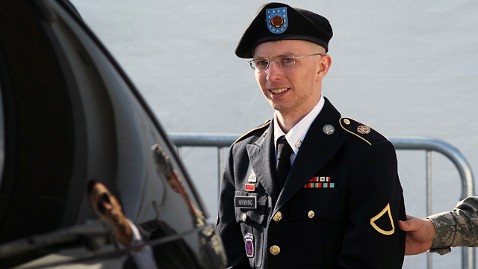Bradley Manning Trial: Lawyers Argue to Drop Some Charges

Image credit: Alex Wong/Getty Images
Original Post at 10:29 a.m. ET. Updated at 2:25 p.m. ET. Bradley Manning sat in the Ft. Meade military courtroom Thursday wearing a new pair of clear, thin glasses and was seemingly engaged as his lawyers argued in pretrial motions that some of the charges against him should be dropped and asked current State Department employees about the agencies response to the Wikileaks.
At least 20 supporters donning "truth" shirts sat behind him and throughout the courtroom.
Yesterday, the defense argued that the government was purposefully "padding discovery," giving more pages to defense lawyers than necessary to hide where the important information was located.
The judge denied this motion, saying that discovery pages were "voluminous" but not purposefully padded. The court ruled that although material will have to continually be turned over to the defense, the government does not have to highlight where in the material information that may be pertinent to the defense is located.
Bradley's defense called two witnesses from the State Department this morning as part of their discovery motion. The first witness, former State Department Director of the Office of Management Policy Right Sizing and Innovation Policy Marguerite Coffey, who still works for the State Department in a different role, talked about efforts at the State Department to beef up information security, particularly on the use of "thumb drives."
Defense lead, David Coombs, wanted to know where in government documents he could find the minutes of certain discussions by Cofffey's team. She testified that up until her departure in July 2011 the records were filed in a filing cabinet in her office, but she currently does not have access nor knows if it still exists.
A second witness, Rena Bitter, is Director of the State Department Operations Center. She spoke about two working groups created under her office's auspices: the Wiki-leaks Working Group and the Wiki-leaks Persons at Risk Working Group, which were created by the government to deal with fallout from Wikileaks.
The defense has made it pretty clear that the actual damage done from Manning's alleged release of hundreds of thousands of classified military reports, state department cables, and video clips to the Wikileaks website in 2010 has been minimal, and a platform for their defense. The defense also argued in favor of dismissing eight of the 22 charges against Manning which focus on transmitting classified or sensitive information to unauthorized persons.
One of Manning's lawyers, Joshua Tooman, argued the government was vague and went overboard in these charges because it didn't sufficiently explain who had been injured by the leaks. "(It's) unclear of the type of injury…is it physical injury, is it monetary," he said. Tooman also said the government as overbroad in their charges and as such could have a chilling effect on speech.
Government lawyers disagreed. A decision on that motion to dismiss the charges is expected by close of this sessions hearing. More motions are expected this afternoon, including a defense request to dismiss two of the charges related to allegations that Manning exceeding authorized access of data.